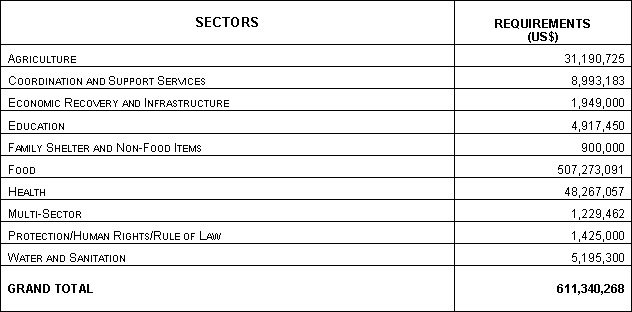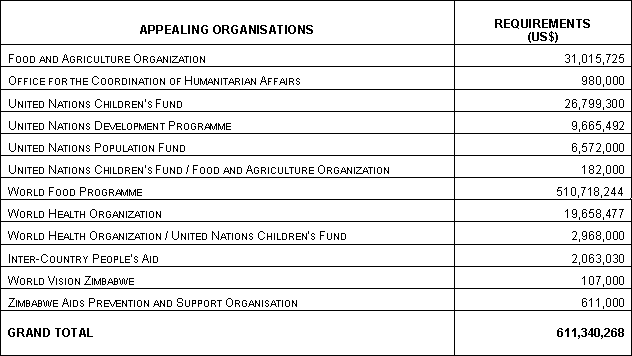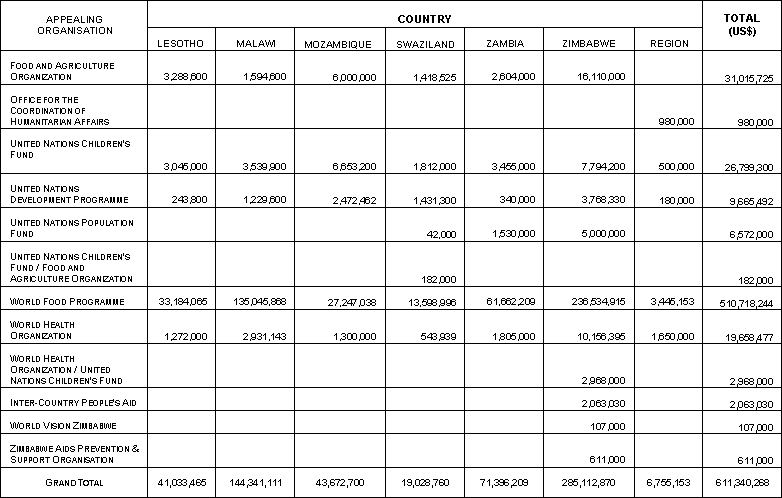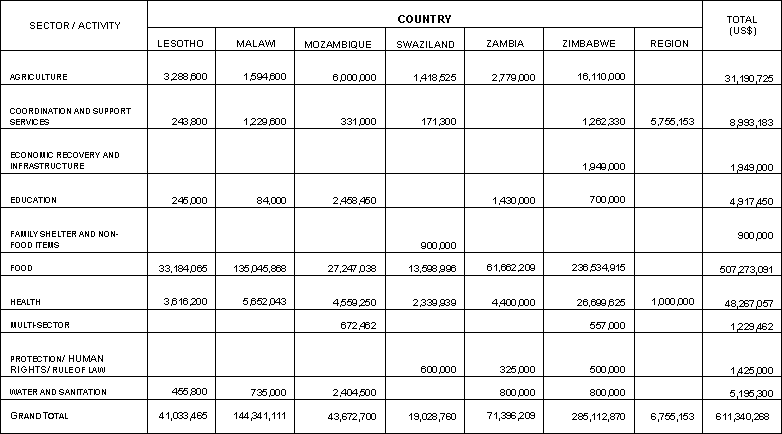EXECUTIVE SUMMARY
Almost 13 million people in Southern Africa are on the very edge of survival as the region struggles with shortages of food not seen since the drought of 1992. While climatic factors again have played their part to create these shortages, the impact of the food deficit in the region have been compounded by questionable government policies and the general economic downturn in region as well as the additional threats caused by limited access to basic social services and an alarmingly high prevalence of the Human Immune-deficiency Virus (HIV). It is estimated that 12.8 million people (of whom more than half are children) will be threatened by starvation and communicable diseases such as measles, cholera, malaria, the plague and Human Immune-deficiency Virus / Acquired Immune-deficiency Syndrome (HIV/AIDS) that will lead to increased morbidity and mortality unless collective action is taken to address the current humanitarian crisis. The magnitude of the humanitarian crisis in Zimbabwe where over 6 million people are at risk is of particular concern.
The aim of this document is to bring to the attention of the International Community the severity of the current crisis in Southern Africa and to support the efforts of national Governments to mobilise sufficient resources to prevent a humanitarian catastrophe. The document provides an overview of the current crisis, an outline of the critical issues that are affecting lives and livelihoods in the region and a framework within which the requirements in the most critically affected countries can be viewed. In this respect, the document reflects on the needs in Lesotho, Malawi, Mozambique, Swaziland, Zambia and Zimbabwe although it should be understood that the effects of the current crisis are felt in other countries in the region.
Recent destabilising events, in concert with underlying food insecurity, high prevalence of HIV/AIDS and chronic malnutrition, have led to a dire situation that requires immediate humanitarian assistance. In addition to a massive food aid operation, urgent support is needed throughout the region in the sectors of agriculture, health, nutrition, water and sanitation, and education/protection. Humanitarian assistance in these areas will be provided on the basis of priority of human need alone and without conditionality. Special consideration will be given to the most vulnerable and socially excluded groups including the elderly, female-headed households, children and those infected with HIV/AIDS.
The approach presented in this document has been developed through concerted assessment and dialogue with all stakeholders (Governments, Non-Governmental Organisations [NGOs], Red Cross Movement and South African Development Community [SADC] technical bodies) and as such, encompasses common understandings of needs and priorities. While the needs identified in this document, and as elaborated in the individual country Appeals, are of an immediate short-term nature, these needs should be viewed against the growing structural deficiencies that are prevalent in the region. For this reason, this programme of planned humanitarian support is not considered as an end in itself. In view of the length of time taken to recover from serious food insecurity and drought, United Nations (UN) agencies and their partners stress from the outset that the package of assistance presented within the framework of this document should be part of revised approaches to tackling food security needs to preventing HIV/AIDS and other communicable diseases and reversing the negative trends affecting the livelihood of many people in the region.
Notwithstanding, donors are urged to respond now to solve immediate food shortages and institute emergency measures in the crucial “non-food” sectors. It is paramount that assistance is provided immediately so that major famine and an ensuring humanitarian catastrophe can be averted. The total amount requested to support and implement humanitarian activities in the six countries is US$ 611 million.
TABLE I: TOTAL FUNDING REQUIREMENTS FOR THE UNITED NATIONS CONSOLIDATED INTER-AGENCY APPEAL IN RESPONSE
TO THE HUMANITARIAN CRISIS IN SOUTHERN AFRICA 2002 – 2003 BY SECTOR AND APPEALING ORGANISATIONS
July 2002 – June 2003


TABLE II: TOTAL FUNDING REQUIREMENTS FOR THE UN CONSOLIDATED INTER-AGENCY APPEAL IN RESPONSE TO THE
HUMANITARIAN CRISIS IN SOUTHERN AFRICA 2002 - 2003 BY AGENCY AND COUNTRY

TABLE III: TOTAL FUNDING REQUIREMENTS FOR THE UN CONSOLIDATED INTER-AGENCY APPEAL IN RESPONSE TO THE
HUMANITARIAN CRISIS IN SOUTHERN AFRICA 2002 - 2003
BY SECTOR AND COUNTRY

|






